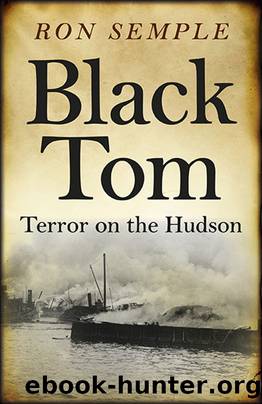Black Tom: Terror on the Hudson by Semple Ron

Author:Semple, Ron [Semple, Ron]
Language: eng
Format: epub
ISBN: 978-1-78535-111-2
Publisher: John Hunt (NBN)
Published: 2015-10-30T00:00:00+00:00
Woodrow the Weak
âI despise Wilson.â
Thatâs how Teddy Roosevelt summed up his feelings about President Woodrow Wilson, the man who had bested him in the three-way race for president in 1912.
His antipathy really wasnât based on Wilsonâs approach to domestic problems. Both were leaders of the progressive wing of their party; the principal difference being that Roosevelt would have used the Federal government to implement needed social change while Wilson, fearing big government, favored a more decentralized path.
No, the visceral dislike was rooted in their polar opposite personalities and, more importantly, their approach to foreign affairs.
When Roosevelt was president, a Greek-American businessman, Ion Perdicaris, was kidnapped and held for ransom in Morocco by Ahmed ibn-Muhammed Raisuli.
The next day Roosevelt ordered a naval squadron to Morocco. Waiting a month to give the warships time to get there, a blunt message then was sent to the Sultan of Morocco.
âPerdicaris alive or Raisuli dead.â Perdicaris was released two days later and the squadron sailed for home.
The RMS Lusitania was torpedoed and sunk by a German U-Boat on May 7, 1915, killing 1,195 people including 128 Americans.
Three days later, Wilson gave his âToo Proud to Fight Speechâ preferring to chastise the Germans with a series of diplomatic notes.
Roosevelt was choleric. He thought that the United States had little choice but to declare war on Germany and fight on the side of Great Britain.
In a letter written to a friend he said, âIf Lincoln had acted after the firing of Sumter in the way that Wilson did about the sinking of Lusitania, in one month the North would have been saying they were glad he kept them out of the war and that they were too proud to fight and that at all hazards fratricidal war must be averted.â
Roosevelt knew American public opinion was against entering the war. He also knew the American army was unprepared for this kind of war. Barely a hundred thousand strong it was 1/20th the size of the German army and was poorly equipped. The highly politicized part time National Guard was in much worse shape.
Roosevelt, who had led the âRough Ridersâ in their famous charge up San Juan Hill, favored universal military training.
Thus was born the âPreparedness Movement.â If Wilson wouldnât act to strengthen Americaâs army, some famous, influential private citizens would. Roosevelt threw his support to General Leonard Wood, the former Army chief of staff, who wanted to build up a strong army and navy for defensive purposes.
A pair of former Secretaries of War also backed Woodâs concept of requiring 600,000 men who turned eighteen each year to undergo six months of military training and then be assigned to reserve units, not the National Guard.
Wilson abhorred the concept and it drew fierce opposition from womenâs groups, churches, pacifists and others who feared a big military. It went nowhere.
The Preparedness people, who were certain war was inevitable and strongly leaned towards joining Britain, turned to the Plattsburg Movement. More than 20,000 young college graduates learned the rudiments of military service at summer camps there during 1915 and 1916.
Download
This site does not store any files on its server. We only index and link to content provided by other sites. Please contact the content providers to delete copyright contents if any and email us, we'll remove relevant links or contents immediately.
A Dictionary of Sources of Tolkien by David Day(811)
Becoming George Orwell by John Rodden(801)
Soul at the White Heat by Joyce Carol Oates(636)
North Woods by Daniel Mason(516)
The Nostalgic Imagination by Collini Stefan;(502)
Graham Greene by Graham Greene & John R. Macarthur(499)
Celtic Unconscious, The by Barlow Richard;(453)
Keep Forever by Alexa Kingaard(445)
Borges and Black Mirror by David Laraway(403)
Indigenous Vanguards by Ben Conisbee Baer;(390)
Transferences by Maren Scheurer;(372)
Duchamp Is My Lawyer by Kenneth Goldsmith(369)
Writing in Limbo by Simon Gikandi(355)
Sphinx by Christian Jacq(351)
Deviance in Neo-Victorian Culture by Saverio Tomaiuolo(344)
Socialist Cosmopolitanism by Nicolai Volland;(343)
Is that Kafka?: 99 Finds by Reiner Stach(302)
The Studio Girls by Lisa Ireland(290)
Samuel Beckett and the Politics of Aftermath by James McNaughton(286)
